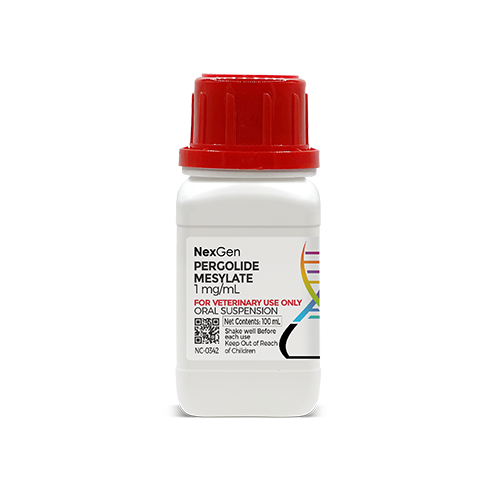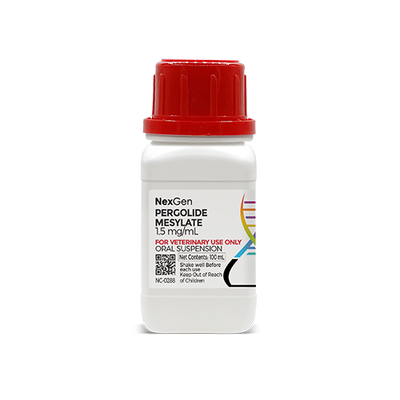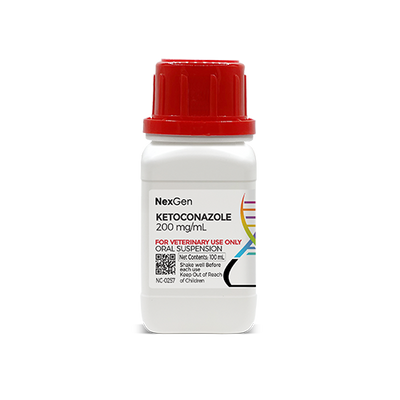
Pergolide Mesylate 1 mg/mL, Oral Suspension, (100mL)
Login for pricing
- Brand
- Mixlab
- SKU:
- NC-0342
- Product Type:
- Suspension
- Size:
- 100ml
- Administration:
- Oral
Pituitary pars intermedia dysfunction, also known as Cushing’s Disease, affects hormone production pathways in the brain from the hypothalamus and pituitary glands. The release of hormones from the pituitary gland is normally controlled by the hypothalamus through the neurotransmitter dopamine.
In cases of PPID, the degeneration of neurons that produce dopamine results in an inability to control the hormones produced by the middle lobe of the pituitary gland (pars intermedia). High levels of these hormones affect processes throughout the body. PPID is age-related, typically occurring in horses older than 15 years of age, although horses as young as 7 have been diagnosed with PPID.2
PPID and equine metabolic syndrome (EMS; a more recently described syndrome that shares certain characteristics with PPID) are often encountered in aging horses and may include several recognizable signs, including laminitis.3 Diagnoses and treatments for PPID and EMS differ, so it is important to have an experienced equine veterinarian diagnose horses suffering from the described symptoms.
Common signs of PPID in horses include:
-
Failure to shed
-
Long, curly coat (often along the jaw line with feathering near the fetlocks)
-
Chronic infections
-
Repeated occurrences of laminitis with hoof abscesses
-
Excess sweating
-
Polyuria/polydipsia (PU/PD)
-
Lethargy
-
Loss of muscle mass (in untreated horses)
-
Pot-bellied appearance
-
Infertility, or lack of estrus cycles
-
Abnormal development of mammary glands
Approximately 30% of horses with PPID will also evidence the signs of insulin dysregulation; in these horses, blood insulin levels run high because their tissues have developed a decreased insulin response. Insulin dysregulation is usually indicative of EMS. PPID and EMS can present at the same time in the same horse, so knowledge of a horse’s insulin status is important for assessing the risk for laminitis and determining dietary management.4
Pergolide Mesylate for Equines
The prognosis for horses with PPID varies, with some horses responding to a low level of medication and others needing a much higher level. Earlier diagnosis may result in a better quality of life, particularly if negative consequences like infections and laminitis can be avoided.4
Where to buy Pergolide Mesylate
Pergolide mesylate is available in the U.S. through pharmaceutical manufacturers and through veterinary custom compounding companies. PERGOLIDE MESYLATE 1.0 MG/ML ORAL SUSPENSION, 100ML by NexGen Pharmaceuticals is indicated for the treatment of pituitary pars intermedia dysfunction (PPID) in the horse.
This product carries minimal potential drug interactions, however it is advisable to consult your veterinarian prior to beginning any treatment regimen.
FOR RX ONLY: A valid prescription from a licensed veterinarian is required for dispensing this medication.
2Durham, A. Endocrine Disease in Aged Horses. Vet Clin North Am Equine Pract. 2016 Aug; 32(2):301-15.
3McFarlane, D.Equine pituitary pars intermedia dysfunction. Vet Clin North Am Equine Pract. 2011 Apr; 27(1):93-113.














